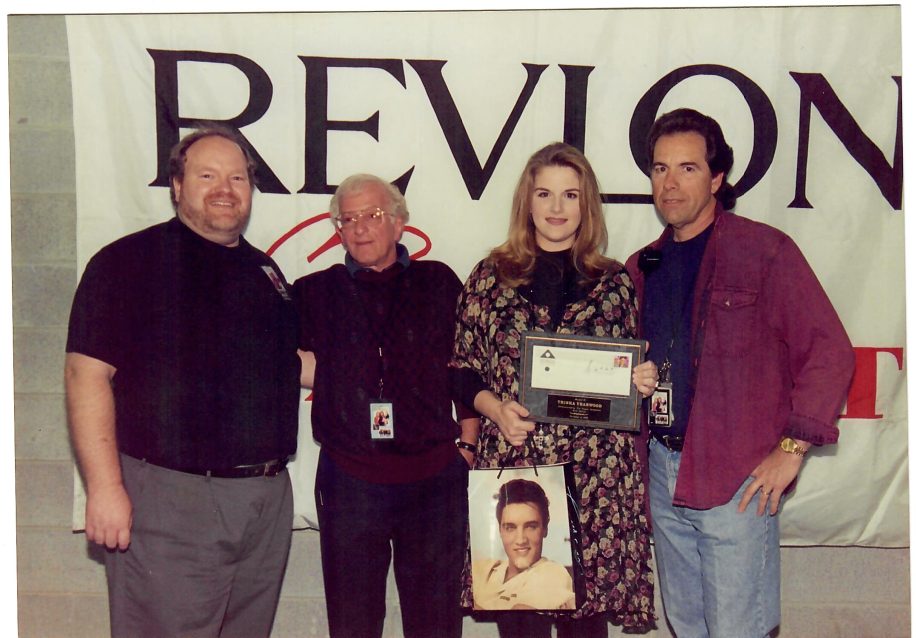PHOTO: Michael Marion, the late Tony Ruffino, Trisha Yearwood and the late, newly departed Al Antee. (Courtesy of Michael Marion)
Luckily, relationships still rule. But back in the day, it was easier to book secondary and tertiary market concerts because record companies footed a large portion of the bill to promote album sales.
As concert chairman at Mississippi State in 1976, a 22-year-old Michael Marion’s first booking was Billy Joel.
He wasn’t big enough for the coliseum, so Joel played the 4,500-seat McCarthy Gym. “Piano Man” was out and Joel’s second album, “Turnstiles,” had just debuted.
To get the show, Marion called a middle agent in New York named Mike Piranian. At the time Piranian, who later became a very successful agent with CAA before his death years ago, worked for College Entertainment Associates.
“Back then you had a lot of middle agents. Premier’s Frank Barsalona had his rolodex of promoters and that’s all he dealt with,” Marion remembers. “Because Premier was that way, it set up this opportunity for middle agents to sell shows to colleges like me.”
He did deal with some agents at major firms like ICM and William Morris. Since agents divide the country east and west by the Mississippi River, Marion was usually dealing with agents in New York.
“I ended up with Mike to put an offer in for Billy Joel through College Entertainment Associates,” Marion recalls. “You just figured it out. There was a lot of figuring it out back then – no Pollstar tour history back then. But remember, guarantees weren’t that goofy back then because of tour support.”
They paid Billy $4,500, which wouldn’t even cover the catering bill now. The concert was free to students, $3 for non-students.
Billy Joel comes back out the next year, and Marion books it again. This time the guarantee was $7,500. Oh my gosh. Tickets were $3 and $4. Oh wow. The show moved into the 6,000-seat Humphry Coliseum.
“The next year, they want to come back. So we did it again. This is when ‘Stranger’ came out and it was huge. This time they wanted us to use a promoter. We had to go through Bob Kelly of Mid-South Concerts in Memphis. We were all nervous. The guarantee was $40,000.”
And that’s how, for three years in a row, Billy Joel played Starkville, Miss.
And that’s how Marion learned, “Even if you’re in a small place, pretend you’re bigger than you are. By acting like you’re a big place, you can get some big shows.”
Other than a stint in L.A. as an agent, Marion has always been in tertiary markets and that philosophy, along with a lifetime of relationships, has served him well.
When he took his turn at opening what was then Tupelo (Miss.) Coliseum, now BancorpSouth Arena, in 1993, he was glad he would be working with a familiar, funny compatriot, promoter Tony Rufino of New Era Productions in Birmingham.
“I got wind that Rod Stewart was looking to play Huntsville [Ala.]. So I called Rod Stewart’s agent, Mike Piranian. That’s how it works.”
“Where are you?”
“Tupelo.”
“I can’t find you on my f**king map.”
“Put one finger on Memphis and one finger on Birmingham. Now look between them.”
“Okay. How many seats in your building?”
“9,000.”
“How many people in your town?”
“35,000.”
“You’re telling me a third of the people are going to buy tickets to this show?
“Yeah, that’s what I’m telling you.”
Marion convinced Piranian to give him the show; then he had to convince Ruffino to promote it. Ruffino was known for his wit and sarcasm.
“When we were doing a show and it wasn’t doing well, Tony would say, ‘Michael, we gave them every opportunity not to buy a ticket,’ or ‘Michael, they’re staying away in droves. If they’re not buying tickets then you can’t stop them.’”
The night before the Saturday 10 a.m. onsale for Rod Stewart, Tony calls Marion.
“Michael, I’ve got a story for you.”
“Okay, Tony, what is it?”
“There’s this guy who’s just gotten married. It’s their honeymoon. The woman is in the bed and the man is dancing around the bed saying, ‘Honey, this is going to be great, this is going to be fantastic. You can’t believe how great this is going to be.’ Michael, I need you to be that guy.”
“Tony, this is going to be great! This is going to be fantastic!”
Saturday morning dawns and Marion and his wife drive to the new coliseum. As they come over the bridge to the 1,800-spot parking lot, they see it’s full of cars. The show sold out that day.
“I sent Piranian a fax: You’ll have to put us on your f**king map; we sold out!”
Michael Marion is now managing Verizon Arena in North Little Rock, Ark., and he’s still working with the Piranians and Ruffinos of this world.
“My experience has been in Starkville, Miss., Los Angeles, Tupelo, Miss., and Little Rock. How do you sell a small market? You just have to be out there.”
One of the things he learned from venue managers and friends like Barbara Hubbard and Ron Spencer when he was on the agent side of the business is that “when building managers came out and took you to lunch and got to know you, that impressed me. Now that I’m on that side, I’m going to do that.”
“I’m blessed to know these people. When you’re in a secondary market, that’s important.” — Based on a true story as told to Linda Deckard.
